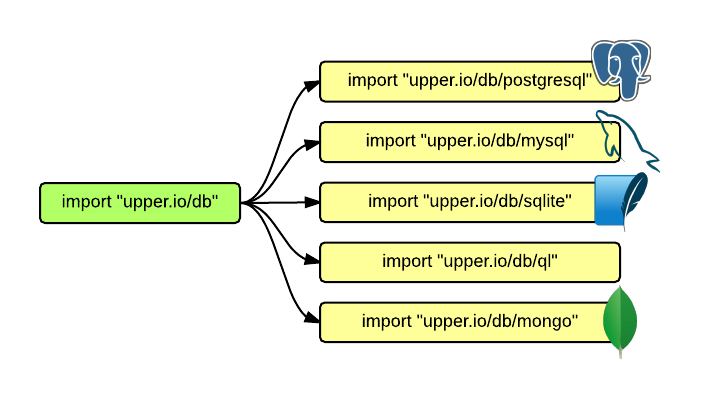# upper.io/db #

## The `db` package ##

`upper.io/db` is a [Go][2] package that allows developers to communicate with
different databases through the use of *adapters* that wrap well-supported
database drivers.
## Is `upper.io/db` an ORM? ##
`upper.io/db` is not an ORM in the sense that it does not tell you how to
design your software or how to validate your data, instead it only focuses on
being a tool that deals with common operations on different databases:
```go
// This code works the same for all supported databases.
var people []Person
res = col.Find(db.Cond{"name": "Max"}).Limit(10).Sort("-last_name")
err = res.All(&people)
```
In strict sense `upper.io/db` could be considered a really basic non-magical
ORM that rather stays out of the way.
## Supported databases

`upper.io/db` attempts to provide full compatiblity for [CRUD][2] operations
across adapters. Some other operations (such *transactions*) are supported only
on specific database adapters, such as MySQL, PostgreSQL and SQLite.
* [MongoDB](https://upper.io/db/mongo) via [mgo](http://godoc.org/labix.org/v2/mgo)
* [MySQL](https://upper.io/db/mysql) via [mysql](https://github.com/go-sql-driver/mysql)
* [PostgreSQL](https://upper.io/db/postgresql) via [pq](https://github.com/lib/pq)
* [QL](https://upper.io/db/ql) via [ql](https://github.com/cznic/ql)
* [SQLite3](https://upper.io/db/sqlite) via [go-sqlite3](https://github.com/mattn/go-sqlite3)
## User documentation #
See the project page, recipes and user documentation at [upper.io/db][1].
[1]: https://upper.io/db
[2]: http://golang.org
[3]: http://en.wikipedia.org/wiki/Create,_read,_update_and_delete

